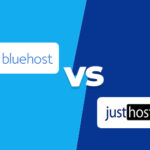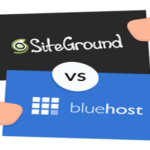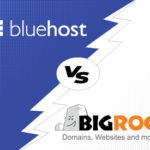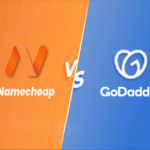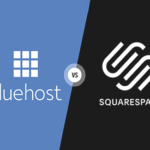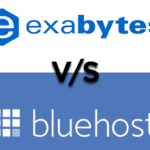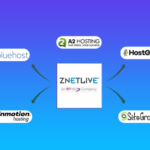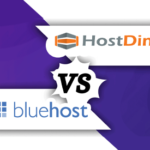Bluehost vs WordPress.com are both notable businesses to consider if you want a simple and affordable approach to launching a WordPress website. Both companies offer well-liked web hosting services. For instance, the fact that WordPress.com offers a free plan and some premium hosting options is a glaring distinction between the two. But there are some cons to this free plan.
In this Bluehost vs. WordPress.com comparison, we’ll examine the various hosting packages provided by both businesses, describe how each service operates, highlight their key distinctions, determine which offers the quickest loading speeds, and more.
This tutorial is for you if you want to build a new WordPress website but aren’t sure if Bluehost or WordPress.com hosting is the best choice.
Overview of Bluehost vs WordPress
Even though WordPress.org offers free software downloads, you’ll still need to register with a web host to have your WordPress website publicly accessible online.
Choosing a cheap general-purpose shared hosting company like Bluehost is one option; another is to join WordPress.com and let them handle hosting your website.
With just a few clicks, you can sign up and establish a new WordPress site using the WordPress.com website’s free and paid hosting plans.
On the Bluehost website, you may choose paid options that make starting a new WordPress website simple.
These two solutions have several differences, including simplicity of use, independence, features, and performance, which we explore in this comparison, even if it may seem like Bluehost and WordPress.com offer the same service—hosting your WordPress website.
Pricing Plan
You can use WordPress.com for nothing if you are okay with a generic name and a few restricted features. If not, the expenses are:
- Personal: $4 per month
- Premium: $8 per month
- Business: $25 per month
- eCommerce: $45 per month
You must think about the premium plan or a higher-level plan if you want to establish a professional website. There are customization choices, 13 GB of storage, and monetization methods available.
Again, you must pay for at least the WordPress.com Business plan if you want to have the ability to install your plugins and themes (like you can on any Bluehost account).
Here is a summary of Bluehost shared hosting plans for comparison:
- Basic: from $2.75 per month
- Plus and Choice Plus: from $5.45 per month
- Pro: from $13.95 per month
You get unlimited storage and more spam defense with the Plus package. Additionally, you get access to the whole collection of WordPress plugins and themes, many of which are free and let you use functionality similar to that offered by WordPress.com. Due to this, Bluehost offers a significantly better financial return.
Ease Of Use
To employ the WordPress CMS on Bluehost, you must initiate the WordPress installation on your server. Bluehost simplifies this process through a step-by-step setup guide. You must respond to a few prompts, and Bluehost will install the application into the appropriate server directory.
You can choose from various complimentary themes within the installation procedure or stick with the default theme.
After the installation, you can head over to your WordPress website’s dashboard to begin personalizing your site. This can be done by integrating free or premium themes and a range of WordPress plugins, all directly accessible from your dashboard.
Depending on the specifics of your hosting plan, you can set up multiple websites under the same hosting account. It’s worth noting that regardless of your chosen hosting plan, you can utilize a custom domain.
Constructing a WordPress website on WordPress.com is a straightforward process. There’s no requirement to install WordPress CMS, as it comes pre-installed manually.
With the free hosting plan, all you have to do is set up your account, and you’ll be directed to the WordPress dashboard equipped with pre-configured plugins and a selection of free themes.
The user interface on WordPress.com is thoughtfully arranged, allowing you to dive right into creating your blog posts.
Nevertheless, it’s important to note that the dashboard here differs significantly from self-hosted WordPress setups (where you install WordPress CMS using hosting services like Bluehost).
This distinction doesn’t imply complexity. The dashboard is intuitive, making it easy to locate all the essentials for kickstarting your blog with just a few clicks.
Performance
Ensuring your web host maintains a solid track record of uptime is crucial. When your website experiences downtime, you risk losing valuable readership, potentially resulting in a significant dip in your online earnings.
Reputable web hosting providers typically boast an annual uptime rate of 99.9% or higher. Both Bluehost and WordPress.com fall squarely within this range.
Bluehost maintains an uptime of approximately 99.98%, indicating that your website might be inaccessible for roughly 1 hour and 45 minutes each year. WordPress achieved a flawless 100% uptime in the previous year, albeit over a shorter time.
Bluehost and WordPress.com deliver impressive speed, suggesting that any declines in site performance are likely attributable to factors that can be addressed on your end. For example, excessively large images can contribute to slower loading times.
Customer Support
One of the standout features of Bluehost is its dedicated and readily accessible support team.
Their customer support personnel are there to assist you with integrating Bluehost and WordPress and with various tasks and queries within the WordPress platform.
You can easily initiate a live chat session with their customer service team whenever you are in a bind or need guidance. Bluehost’s live chat support operates 24/7, extending even to their most budget-friendly plan.
In contrast, WordPress.com restricts live chat support to its Premium plan and higher tiers. To enjoy round-the-clock live chat assistance, you should opt for the Business plan, which costs considerably more than the Personal and Premium plans.
Final Thoughts!
Having a self-hosted WordPress.org installed that can be customized, having better customer service, and being able to scale as your website grows are among Bluehost’s main advantages over WordPress.com.
But in between Bluehost vs WordPress, if you want limitless modifications, robust eCommerce options, and the capacity to extend as your business grows as a sole proprietor or blogger on a tight budget, Bluehost is a better option.




